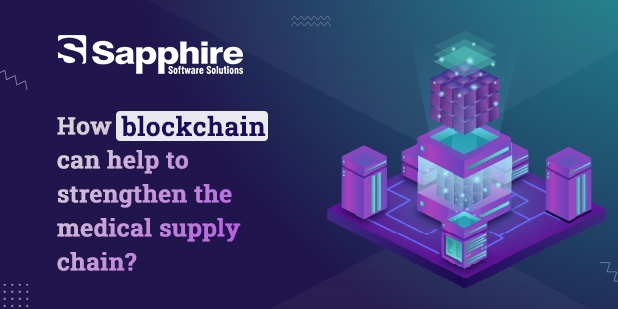The medical supply chain and technology is an essential component in the process of ensuring that patients all over the globe have access to necessary pharmaceuticals, medical equipment, and healthcare supplies. Nevertheless, this complex network faces several difficulties, such as the proliferation of counterfeit goods, a lack of transparency, inefficiencies, and poor traceability. Blockchain technology, which was first designed to ensure the safety of digital transactions, provides a viable answer to these problems. This extensive blog article will examine how blockchain technology supply chain management can change the medical supply chain by increasing efficiency, expanding transparency, and saving lives.
Understanding the Medical Supply Chain:-
Blockchain technology in SCM can strengthen the medical supply chain by addressing the challenges associated with its complex and fragmented nature. The medical supply chain involves numerous stakeholders, including manufacturers, distributors, pharmacies, hospitals, and regulatory bodies, relying on effective coordination and timely access to accurate information.
The medical supply chain has traditionally been plagued by a lack of transparency, inefficient processes, and vulnerabilities to errors and fraud. Paper-based documentation and disparate systems make it challenging to track and trace products accurately, leading to delays, increased costs, and potential risks to patient safety.
Blockchain offers a decentralized and transparent ledger that can be shared among all stakeholders, creating a unified system for recording and managing the supply chain processes. This shared, immutable record provides a single source of truth, allowing for real-time visibility into the movement of products, transactions, and inventory levels.
By implementing blockchain technology, stakeholders can comprehensively understand the medical supply chain, enabling them to identify inefficiencies, streamline processes, and make informed decisions. The transparent nature of the blockchain also enhances trust among stakeholders, as they can verify the integrity and authenticity of the recorded information.
Additionally, blockchain facilitates secure and efficient data sharing among stakeholders while ensuring patient privacy. Authorized participants can access relevant information securely, leading to improved collaboration, better decision-making, and optimized inventory management.
The blockchain’s ability to enhance the understanding of the medical supply chain also extends to regulatory compliance. Regulatory bodies can leverage the transparent and auditable nature of the blockchain to verify compliance with standards and regulations, reducing administrative burdens and improving the efficiency of regulatory oversight.
Improving Traceability While Maintaining Authenticity:
Blockchain technology can significantly enhance traceability and authentication in the medical supply chain. By leveraging the decentralized and immutable nature of the blockchain, every step of the supply chain process can be recorded, providing real-time tracking and verification of products.
Counterfeit drugs have become a primary concern in the healthcare industry, posing significant risks to patient safety. With blockchain, each product can be assigned a unique identifier recorded on the distributed ledger, allowing for easy verification of its origin, manufacturing details, and distribution history. This transparency enables healthcare professionals and patients to authenticate the legitimacy of medications, reducing the risks associated with counterfeit drugs.
Furthermore, the immutable nature of the blockchain ensures that the recorded information cannot be altered or tampered with, providing an added layer of security and trust. This feature is particularly crucial in the medical supply chain, where accurate and reliable information about product authenticity and integrity is vital.
By implementing blockchain technology, stakeholders can create a comprehensive, transparent ecosystem that enables end-to-end traceability. This traceability empowers regulators to monitor the movement of products, identify potential bottlenecks, and take prompt actions in case of any irregularities. It also allows for efficient recall management, as the blockchain can quickly trace the affected products back to their source, ensuring a timely and targeted response to potential safety issues.
Streamlining the Operations of the Supply Chain:
Using blockchain technology across the medical supply chain will result in streamlined operations and increased productivity. Automating various activities, including inventory management, order fulfillment, and payment settlements, is made possible by smart contracts, which are self-executing agreements maintained on the blockchain. This automation lessens the administrative load, reduces the potential for human mistakes, and quickens the entire supply chain process, ultimately resulting in cost savings and more expedient delivery of essential medical items.
Blockchain technology decreases the risk of supply chain interruptions by eliminating dependence on human procedures, ensuring that medical items are instantly accessible when required. The need for human involvement is eliminated, and the risk of mistakes or delays is reduced, thanks to the automation made possible by smart contracts, which allow the automatic execution of established rules and conditions. For instance, if a drug’s expiry date is approaching, the smart contract may send automated warnings to the necessary stakeholders, ensuring that the medication is removed from inventory at the appropriate time and promptly replaced with new supplies.
Enhancing Our Capacity to Manage Inventory:
The medical supply chain needs to have efficient inventory management since this guarantees a sufficient supply of pharmaceuticals and supplies while reducing the amount of waste. The distributed ledger of blockchain technology offers insight into inventory levels in real-time, empowering stakeholders to manage and monitor stock levels precisely. This technique, driven by data rather than intuition, makes demand forecasting, streamlined procurement, and effective inventory distribution much more accessible. As a result, healthcare practitioners are sure to have access to the appropriate items at the appropriate times.
By integrating blockchain technology, suppliers, distributors, and healthcare institutions may share a synchronized picture of inventory levels. This enables greater coordination and reduces the danger of shortages or overstocking of supplies. Stakeholders can spot possible bottlenecks, forecast demand variations, and make educated choices about inventory management because of the blockchain’s openness and real-time nature. As a consequence, medical service providers can maximize the efficiency of their stockpiles, significantly cut down on product waste, and guarantee a steady supply of essential medical supplies.
Increasing Obligation to Comply with Regulations:
The medical supply chain must comply with many regulatory standards, the most important of which are product safety, quality assurance, and licensing. The technology behind blockchain may make it easier to comply with regulations by producing an auditable record of all transactions and operations. This increases both transparency and accountability. This immutable record may be accessed by regulators so that they can check compliance with standards, detect any problems, and swiftly take appropriate steps. And therefore increasing patient safety and decreasing the complexity of regulatory processes.
Using blockchain technology, each stage of the supply chain process may be recorded and authenticated by several different parties. These stages include manufacturing, transportation, and distribution. The regulators can verify compliance with regulatory requirements, such as Good Manufacturing Practices (GMP) or Cold Chain Management, using this record, which is both visible and unchangeable. This ensures that medical items fulfill the needed quality and safety standards by reducing administrative costs and accelerating regulatory monitoring; both are accelerated by using blockchain technology, which streamlines the auditing process.
Sharing Secure Information While Promoting Collaboration:
Many stakeholders in the medical supply chain need to share data to achieve successful coordination. However, worries about the privacy and security of one’s data often act as a barrier to practical cooperation. Blockchain technology provides a decentralized and encrypted platform for safe data exchange. This makes it possible for authorized parties to access important information while still protecting the patient’s right to confidentiality. This makes it possible for healthcare providers, manufacturers, and regulators to communicate data in an effective manner, which ultimately leads to enhanced decision-making, supply chain optimization, and the results of public health studies.
Through cryptographic safeguards and decentralized consensus procedures, blockchain technology guarantees the authenticity and safety of stored data. Patient information, such as their prescription history and other medical records, may be safely maintained on the blockchain, ensuring that only authorized users can access the information. This open and secure platform allows healthcare practitioners to have a full perspective of a patient’s medical history, paving the way for correct diagnoses, suitable treatment regimens, and enhanced patient care.
Challenges and Considerations:
Implementing blockchain in the medical supply chain has specific difficulties, even though it has several advantages. Integration of technology, standardization of processes, scalability, and compliance with regulatory frameworks are some. In addition, addressing concerns about privacy and ensuring that data is protected are essential issues. All stakeholders must work together to build interoperable blockchain solutions, set shared standards, and invest in solid infrastructure.
Implementing blockchain technology requires close cooperation and coordination among various stakeholders, including those in the healthcare industry, manufacturers, government authorities, and those that offer the technology. It is essential for there to be a standardization of data formats, interoperability of blockchain networks, and an alignment of regulatory frameworks to have a flawless deployment. Because so many transactions and data points are involved in the medical supply chain. And scalability is another factor that must be considered. Efforts must be made to guarantee that blockchain networks can handle the number of transactions while preserving their efficiency and speed.
Conclusion:
Hold immense potential that transform the medical supply chain with top blockchain development company, addressing long-standing transparency, traceability, and efficiency issues. By leveraging blockchain’s decentralized and immutable nature. Stakeholders can establish a trustworthy ecosystem that ensures the integrity of medications, streamlines operations, and ultimately saves lives. As a Blockchain development service provider, we can develop the perfect blockchain solution that perfectly suits your business. Hire Blockchain developers in USA, India for your upcoming projects growth and development.






































